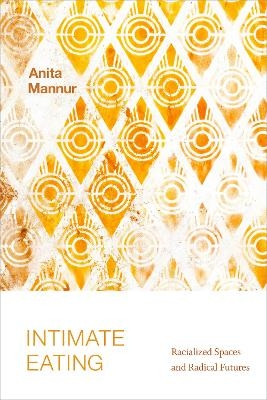
Intimate Eating
Racialized Spaces and Radical Futures
Seiten
2022
Duke University Press (Verlag)
978-1-4780-1520-8 (ISBN)
Duke University Press (Verlag)
978-1-4780-1520-8 (ISBN)
Anita Mannur examines how cooking, eating, and distributing food can create new forms of kinship, intimacy, and social and political belonging for people of color, queer people, and other marginalized subjects.
In Intimate Eating Anita Mannur examines how notions of the culinary can create new forms of kinship, intimacy, and social and political belonging. Drawing on critical ethnic studies and queer studies, Mannur traces the ways in which people of color, queer people, and other marginalized subjects create and sustain this belonging through the formation of “intimate eating publics.” These spaces—whether established in online communities or through eating along in a restaurant—blur the line between public and private. In analyses of Julie Powell’s Julie and Julia, Nani Power’s Ginger and Ganesh, Ritesh Batra’s film The Lunchbox, Michael Rakowitz’s performance art installation Enemy Kitchen, and The Great British Bake Off, Mannur focuses on how racialized South Asian and Arab brown bodies become visible in various intimate eating publics. In this way, the culinary becomes central to discourses of race and other social categories of difference. By illuminating how cooking, eating, and distributing food shapes and sustains social worlds, Mannur reconfigures how we think about networks of intimacy beyond the family, heteronormativity, and nation.
In Intimate Eating Anita Mannur examines how notions of the culinary can create new forms of kinship, intimacy, and social and political belonging. Drawing on critical ethnic studies and queer studies, Mannur traces the ways in which people of color, queer people, and other marginalized subjects create and sustain this belonging through the formation of “intimate eating publics.” These spaces—whether established in online communities or through eating along in a restaurant—blur the line between public and private. In analyses of Julie Powell’s Julie and Julia, Nani Power’s Ginger and Ganesh, Ritesh Batra’s film The Lunchbox, Michael Rakowitz’s performance art installation Enemy Kitchen, and The Great British Bake Off, Mannur focuses on how racialized South Asian and Arab brown bodies become visible in various intimate eating publics. In this way, the culinary becomes central to discourses of race and other social categories of difference. By illuminating how cooking, eating, and distributing food shapes and sustains social worlds, Mannur reconfigures how we think about networks of intimacy beyond the family, heteronormativity, and nation.
Anita Mannur is Associate Professor of English at Miami University, author of Culinary Fictions: Food in South Asian Diasporic Culture, and coeditor of Eating Asian America: A Food Studies Reader.
Acknowledgments ix
Introduction 1
1. The Tiffin Box and Gendered Mobility 23
2. Cooking for One and the Gustatory Gaze 47
3. Eat, Dwell, Orient: Food Networks and Asian/American Cooking Communities 73
4. Tasting Conflict: Eating, Radical Hospitality, and Enemy Cuisine 99
5. Baking and the Intimate Eating Public 129
Epilogue 143
Notes 147
Works Cited 161
Index 171
| Erscheinungsdatum | 21.03.2022 |
|---|---|
| Zusatzinfo | 13 illustrations |
| Verlagsort | North Carolina |
| Sprache | englisch |
| Maße | 152 x 229 mm |
| Gewicht | 408 g |
| Themenwelt | Sachbuch/Ratgeber ► Essen / Trinken |
| Geschichte ► Teilgebiete der Geschichte ► Kulturgeschichte | |
| Sozialwissenschaften ► Ethnologie | |
| Sozialwissenschaften ► Soziologie | |
| ISBN-10 | 1-4780-1520-9 / 1478015209 |
| ISBN-13 | 978-1-4780-1520-8 / 9781478015208 |
| Zustand | Neuware |
| Haben Sie eine Frage zum Produkt? |
Mehr entdecken
aus dem Bereich
aus dem Bereich
der stille Abschied vom bäuerlichen Leben in Deutschland
Buch | Hardcover (2023)
C.H.Beck (Verlag)
23,00 €
vom Mittelalter bis zur Gegenwart
Buch | Softcover (2024)
C.H.Beck (Verlag)
12,00 €


